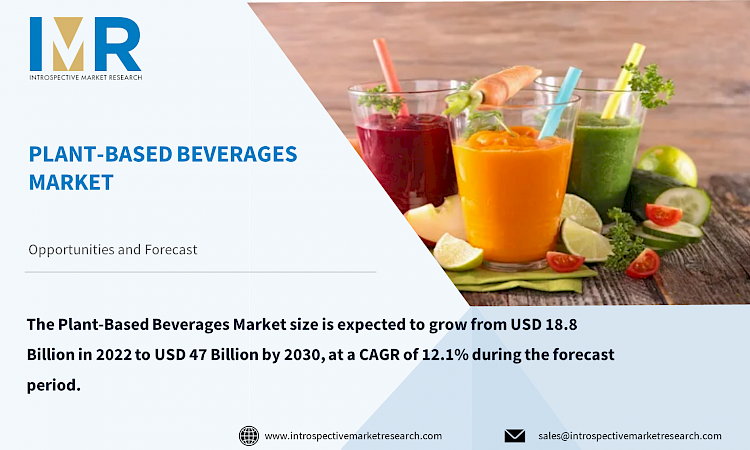Market Overview:
Plant Based Beverages Market Size Was Valued at USD 19.87 Billion in 2023, and is Projected to Reach USD 45.04 Billion by 2030, Growing at a CAGR of 12.4% From 2024-2030.
Plant-Based Beverages (PBB) are drinks made from various plant materials, serving as substitutes for cow's milk due to dietary restrictions or preference for plant-based products. The popularity of PBB is driven by people's awareness of the benefits of plant-based items and social media trends. Fortified with essential nutrients, PBB offers a perfect alternative to animal-based milk, especially for those with allergies or lactose intolerance. Oat, almond, cashew, hemp, and pea-based drinks are gaining widespread acceptance, replacing dairy milk in various beverages, leading to significant growth in the market benefiting beverage producers from dairies to start-ups.
Top Key Players for the Plant-Based Beverages Market:
SunOpta Inc. (Canada), The Hain Celestial Group Inc. (US), Blue Diamond Growers (US), Noumi Ltd. (Austrilia), Califia Farms (US), Oatly Group AB (Sweden), Danone S.A. (France), Nestl? S.A. (Switzerland), Koia (US), Pacific Foods of Oregon LLC (US), Marusan-Ai Co Ltd. (Japan), Living Harvest Foods Inc. (US), Harmless Harvest (US), Earth's Own Food Inc. (Canada) and Other Key Players
Market Dynamics and Factors for Plant-Based Beverages Market:
Drivers:
Surging Awareness regarding the side effects of Non-veg Food
Healthcare experts emphasize that excessive consumption of non-vegetarian food and beverages can negatively impact health, leading to poor digestion and potential heart complications like hypertension and COPD. Studies also suggest a link between high red meat intake and reduced lifespan, as well as an increased risk of cancer, particularly colon cancer. As a result, many individuals are shifting towards vegetarian diets, opting for plant-based beverages as a healthier alternative, particularly for breakfast, indicating significant potential for the plant-based beverages market.
Opportunities:
Growing Global Lactose Intolerant Population
The Plant-Based Beverages Market has experienced significant growth due to rapid urbanization. As more people move to urban areas, there is an increasing awareness of health and environmental concerns, leading to a shift towards plant-based diets and beverages. Urban consumers are seeking healthier, sustainable, and animal-friendly options, driving the demand for plant-based beverages as an alternative to traditional animal-based products. The convenience and availability of these beverages in urban settings further contribute to their growing popularity and market expansion.
Segmentation Analysis of the Plant-Based Beverages Market:
By Type, Milk-type plant-based beverages dominate the Global Plant-Based Beverages Market due to their widespread adoption as substitutes for cow's milk, driven by health-conscious consumers, dietary restrictions, and environmental concerns.
By Source, Soy-based plant-based beverages dominate the Plant-Based Beverages Market source for several reasons. Firstly, soy-based beverages have been available in the market for a long time, establishing a strong presence and consumer familiarity. Secondly, they are widely available in various retail outlets, making them easily accessible to consumers.
Regional Analysis of the Plant-Based Beverages Market:
The plant-based beverages market is experiencing rapid growth, particularly in Europe and North America, with North America leading in total share and revenue. The rise in environmental concerns, food intolerance, and allergies in the region has fueled the adoption of dairy alternatives, benefiting the market for plant-based beverages. The increasing inclination towards a vegan lifestyle and consumption of plant-based lactose-free products in North America is driven by their nutritional benefits, including better calcium absorption, improved bone health, and higher energy levels, further boosting the regional market for plant-based beverages.
Key Industry Development:
In January 2023, Califia Farms Launched its USDA-Certified Organic Oat milk and Almond milk Among Other Newest Items. Like all Califia Farms products, these new launches are also made with plant-based, dairy-free ingredients and are Non-GMO Certified, Kosher, vegan, and free from carrageenan and soy.
In April 2021, SunOpta Inc. acquired the Dream and WestSoy brands from The Hain Celestial Group, Inc., for $33 million. The company states that the goal is pursuing strong organic and inorganic growth in its plant-based business. The acquired companies, the Dream brand is the No. 2 brand of shelf-stable, plant-based milks, originally launched in 1982 and the WestSoy is a branded shelf-stable soy beverage.






